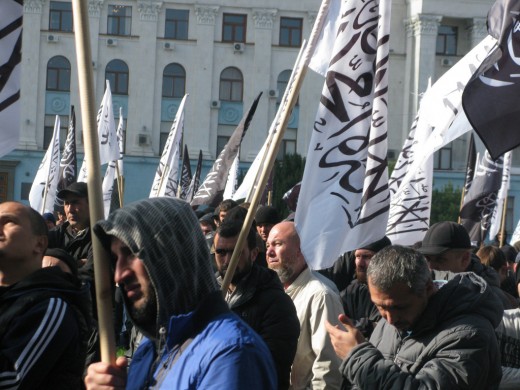On Monday, hundreds of Muslims demonstrated in Simferopol in the Ukrainian Black Sea region of Ukraine, after a music theater in the city refused to allow the Islamist Hizb al-Tahrir organization to use its premises for an international forum.
Demonstrators in Simferopol’s central square said that no good reason had been given for the refusal.
“We believe this is discrimination against Crimean Muslims and discrimination against Islam,” one of the organizers of the meeting told reporters.
During Monday’s rally, the leader of Hizb al-Tahrir’s information office in Ukraine, Fazil Amzayev, told reporters that, “The majority of the population in Ukraine are not Muslims, so our organization is not working in Ukraine to change the governmental system.”
Hizb al-Tahrir is a London-based Sunni political organization that seeks to unite Muslim countries into an Islamic caliphate. The group, established in 1953 in East Jerusalem, has been banned by Ukraine’s neighbor, Russia, and by several central Asian countries. Germany has also banned the group, saying that it spreads anti-Semitic and anti-Israeli propaganda. In Ukraine, however, the group falls outside the country’s legal framework, as it is not officially registered as a party or as a religious organization. The group does have an official website in Russian and Ukrainian, however, in which it refers to itself as a “party”.
The group has drawn criticism from other Muslim organizations in Ukraine.
Ukraine has around 393,000 Muslims, although the exact figure is unknown and even controversial (some organizations put the number as high as two million).
In Crimea, Muslims — mostly Crimean Tatars — make up about 12 percent of the population.
The Crimean Tatars have long complained of widespread religious and racial discrimination by the Ukrainian authorities, and say that this is on the rise.
In June, the Unrepresented People’s Organization (UNPO) submitted a report to the UN Human Rights Committee, noting, among other things, that Crimean Tatars are underrepresented in politics and had failed to win any seats in the 2012 elections; have a high unemployment rate; faced violence from neo-Nazi groups; and face religious discrimination including in obtaining permission to build mosques and registering new Muslim communities.
The report also noted that Islamophobia is on the rise in Ukraine, citing a 2012 incident in Simferopol where Molotov cocktails were thrown at a building designated to become a new mosque.
The rise in discrimination — both real and perceived — among Ukraine’s Muslims, and the support shown for Hezb al-Tahrir in the Simferopol demonstration comes amid increasing fears in Ukraine and in its close neighbor, Russia, of radicalization among the former Soviet Republics’ Muslim populations, which Moscow in particular sees as a serious threat to stability.
On Monday, as the demonstration in Simferopol took place, Russia’s Radio Vesti published comments from Russian sociologist Islamic expert Roman Silantyev, who said that Hezb al-Tahrir was a terrorist group and warned that since the fall of the USSR it had expanded in the region — and that it posed a threat in Russia but particularly in Ukraine where it is not banned.
Silantyev warned, “They are really organizing terrorist attacks, they are preparing for the violent overthrow of the government. This organization is not always recognized as a terrorist group. In Ukraine, for example, [it’s not recognized] as yet, but apparently the positive trends are being observed, even Muslim organizations in Ukraine are calling for them to be included on the list of terrorist organizations. Despite its claims of peaceful intentions, really, the organization arranges attacks . But since they do so clumsily and act very boldly, they are often caught, they rarely manage to make something actually explode. But this does not mean that they are safe and peaceful.”
One outcome of Russia’s growing fears of Islamic radicalization has been Moscow’s unstinting support for Syrian President Bashar Al Assad. Although Russia sees its role in Syria as an ally of Assad, Moscow sees Islamic extremism — its view of the insurgency — as a threat to its own national security. That view has intensified with increasing reports of Russian-speaking jihadists, mostly from the Caucasus but also from Crimea, fighting in Islamist factions Jaish Al Muhajireen Wal Ansar and the Islamic State of Iraq and Ash Sham.
This position is not likely to ease, particularly as groups like Hezb al-Tahrir have also urged Muslims to go to Syria to wage jihad against the Assad regime. In a Hezb al-Tahrir rally in Simferopol earlier this year, some speakers called on demonstrators to go to Syria
Hezb al-Tahrir’s Ukraine spokesman Amzaev has also said that Ukrainian Muslims are fighting in Syria, although he noted that his organization was not involved in recruiting.
Amzaev told the BBC in September that he could not rule out that Crimean Tatars go to Syria as “individuals”.
We’re not campaigning for Ukrainian Muslims to go to Syria and take part in the fighting. However, we do not discourage them from such intentions,” he added, noting that Ukrainian Muslims took part in the fighting because “the regime of Bashar al-Assad is criminal, but because assisting the resistance morally, financially or physically is legitimate from the point of view of Islam.”

